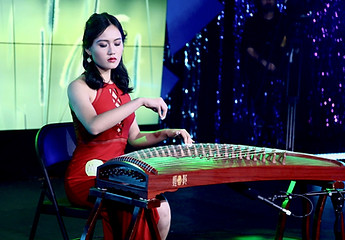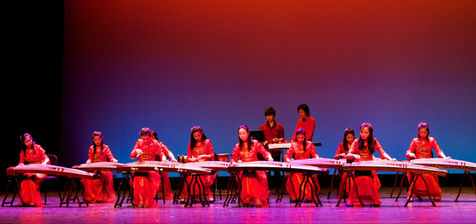
Having personally struggled with several eating disorders, I made these infographics in 2021 to highlight the bidirectional oral health implications of eating disorders and highlight ways for dental professionals to help. These infographics were featured on Harvard ASDA's official Instagram Page.
Music Bio - Bree Zhang
My Guzheng Story
How it all began...
When I was 5 years old, I heard beautiful plucking sounds coming from a next door classroom. Discovering that the music was produced by the guzheng 古筝, I begged my mother to let me learn how to play. Unfortunately, I was too young at the time to be accepted by the teacher, Yang Yi 杨艺, so I eagerly waited for three years and finally got the chance to learn at 8 years old. Little did I know that 古筝 would become one of the most formative parts of my life.
With any instrument, no one starts out a master. Sometimes I practiced a lot. Other times, I got frustrated and didn't practice, leading my mom to sign me up for performances, which often forced me to practice since I didn't want to embarrass myself onstage. My teacher was wonderful. High expectations yet so caring and kind. Slowly, I improved. As clumsy plucking strung together, my performances locations gradually improved from cramped local churches to concert halls. As I learned about each song's history, culture, symbols, and emotions, I learned how to express myself. My 古筝 became a safe space where I had control and agency over each note, where I could de-stress and release emotions.

Local Church 2011

Young Musician's Showcase Grand Prize Showcase Carnegie Hall 2015
Music From China Youth Orchestra
In 7th grade, I joined Music From China Youth Orchestra (MCFYO). My time at the orchestra was marked by a series of firsts. It was my first time playing under a conductor, Wang Guowei 王国维. My first time being exposed to so many Chinese instruments, such as the Erhu 二胡, Yangqin 扬琴, Liuqin 刘琴, Zhongruan 中阮, Dizi 笛子, and Hulusi 葫芦丝, all with their own quirks and sound qualities. (二胡 is like a two stringed fiddle, 扬琴 is a hammered dulcimer, 葫芦丝 is like a recorder made from a gourd). Best of all, it was my first time meeting a community who were all passionate about Chinese music and their culture.

MFCYO Carnegie Hall 2014
Teaching the Guzheng 古筝
In 2014 of my freshman year in high school, I co-founded a 古筝 class at Huaxia Bridgewater Chinese School with Joyce Lu. Being a first-time teacher, I went through rough waters, but the first times always do--that's what's special about them. Teaching is like taking what you know and translating it into 20 different languages. It's difficult when your students get frustrated or don't practice (haha now I understand my teacher's pain), but it's so rewarding see that spark in my students' eyes when they master a skill. Eventually, I got to bring my students to perform in places like the Somerville Heritage Festival and Bridgewater Rehabilitation Center.
Even though I do not teach anymore (my mother has taken over the class), I still stay in contact with my students. Each year, we have an annual New Years Potluck event where all my old students (and their parents) gather at my house to eat, celebrate, and catch up. We also hold a performance in which everyone plays a 古筝 song they have been learning so we can see each other's improvement over the years. I always tend to premiere my new compositions on this day :)

Bridgewater Rehabilitation Center 2015

6th Annual Potluck Gathering 2020
How I Started Composing
In 2016 of my sophomore year in high-school, I took AP Music Theory. This class, combined with my experience in Music from China Youth Orchestra, jump-started my interest in music composition. Exposed to different time signatures, chord progressions, scales, music styles, and instrument capabilities of both eastern and western music, I decided to try composing my own song for MFCYO.
My first song was called "Journey" and the whole composing process was a long journey. I learned to understand the limitations of each instrument, balance and maximize the each performers' dynamic capabilities, and convert western score to Chinese numerical notation. I am thankful for my conductor (Wang Guowei) who wholeheartedly support me. "Journey," which debuted in Drew University June 3rd, 2017. The next year, I composed another orchestral song "Dancing in Snowflakes" which debuted in Drew University during my final concert on June 2nd, 2018. Both songs mix western elements with traditional Chinese elements, combining not only two different styles but also two cultures.
The summer of 2017, I was also inspired to compose a 古筝piece, "Returning Home" dedicated to my grandma. I used this song to compete in Central China Television’s National Talent Competition in Beijing and won 4th place, and I also used my piece to win Gold Prize in the Sinovision Television (Cable Channel 73) Competition: the first time since the competition started in 2010 that a non-western instrument was able to obtain Gold in the Teen’s 14-18 age group.
In 2018, I decided to try combining vocals with 古筝 (which functions almost like a guitar), culminating in a project called “In Ten Years” about college rejection (ironic, yes, I know, but it was composed before I discovered I got into Brown). I also began to cover modern pop songs such as “I Don’t Wanna Live Forever” with guzheng.

Drew University 2017

Sinovision Television Teen Talent Competition 2017
"I Don't Wanna Live Forever" Cover 2018
College, Spotify, and More!
At Brown, I composed 2 new 古筝 songs, "Metamorphosis" (2020) and "Growing Up" (2021), both of which reflect on my growth as an individual over the years. I also have been looking to integrate more western classical elements and contemporary jazz and blues elements into my music, which led me to take "Theory of Tonal Music" and "Jazz and Pop Harmony" at Brown.
During the Spring semester 2020, I started an independent study with Professor Wang Lu to work on my compositions, playing around with jazz chords, altering the tonality of the instrument, exploring new 古筝 sounds such as scratching or hitting or swiping.
Later that year, I wrote another song combining vocals with guzheng, "Daydreams" which reflects on my struggle with my identity and culture. This song, in conjunction with my art piece "The Sides of Me You Don't See," were formative in my journey navigating what it means to be Asian American and Chinese American. Read my full story at My Asian Identity.
.png)
Metamorphosis 2020, Spotify

Daydreams 2020, Spotify
Trying out Improv!
During my final semester at Brown, using what I learned from Jazz and Pop Harmony and Professor Wang's independent study, I joined MEME ensemble, where I learned to let go of my anxiety of perfecting music and enjoy the process of creating music.
Improv is like sketching a rough draft of an idea with a permanent marker and unapologetically owning every single mark and every empty space because these are all parts of the music-making process. Improv gave me comfort in forming ideas but never rehashing or going back because no creation is a mistake, and no mistakes are intentional or unintentional because every note is stuck in a raw, messy, unfiltered, yet beautiful in-between. Most importantly, it erases the distance between the audience and me because the audience is also part of the music-making and storytelling process—and together we have fun.
At the 2022 Senior Talent Show, I was able to explore this collaborative improvisation for the last time at Brown. Together with the audience, we played 2 games:
Game 1: Opposites Attract, inspired by “MEME ensemble”
The audience suggested 2 random emotions (“sad” and “wondrous relief”) that I would express on the guzheng. Then two audience members volunteered to say “sad” and “wondrous relief” back and forth, controlling the time I played these emotions.
Game 2: Improv Storytelling
Members of the audience shouted out 3 random words, and my task was to spin together a story on the spot using these 3 words: Blueno, Poono, and guzheng.

Flyer I Made for MEME Ensemble Final Concert:
Ordinary Improvisation
Learning to Fly
More Guzheng Memories
Music Accolades
Performance Locations
Carnegie Hall
(2014, 2015, 2016, 2017, 2018)
Metropolitan Museum of Art
(2015, 2016)
McCarter Theater
(2015)
Drew University
(2014, 2015, 2016, 2017, 2018)
Rutgers Nicholas Center
(2014, 2018)
Westminster Choir College
(2016, 2017)
Awards and Honors
Brown Commencement Baccalaureate Soloist Performer (2022)
Gold Prize, Sinovision Television Teen's Talent Competition (2017)
Self-composition "Journey" and "Dancing in Snowflakes" performed by MFCYO Orchestra at Drew University (2017-2018)
4th Place, Central China TV Talent Competition (2017)
Grand Prize, National League of Performing Arts Young Musician's Showcase Competition (2015)
1st Place, Princeton International Chinese Music Competition Award (2014)
1st Place, New Jersey Music Teacher's Association Young Musician's Competition (2014-2016)
What is Guzheng?
Guzheng is an ancient Chinese instrument with more than 2,500 years of history. It has twenty-one strings and movable bridges that enable the musician to change scales. The melody is played on the right side of the bridge; the left side is normally reserved for vibratos, slides, and other ornamentations to the music. Playing requires finger picks that are wrapped with tape around the tips of the fingers. Some techniques include tremolo, arpeggios, glissandos, vibratos, and harmonics. The music is read in simplified numerical notation.
For more info about me, check out:
Subscribe to my Youtube Channel for more music updates!
Follow me on Spotify!
.jpg)

















